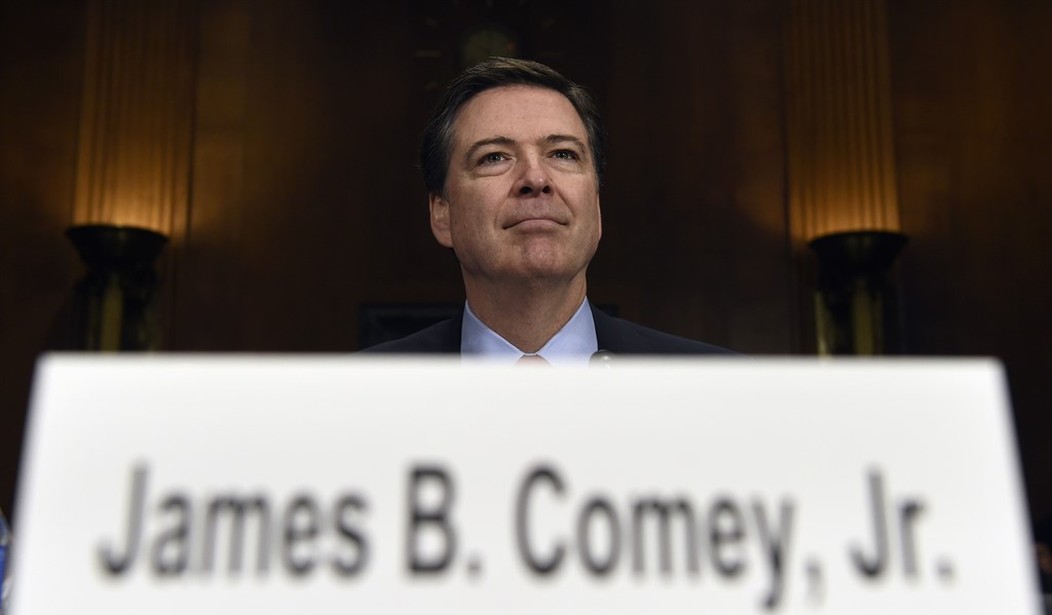Tapper’s source told him yesterday that the Russia investigation was accelerating when Comey was fired, now the WSJ’s sources are telling them the same thing.
Just think, the big story today could have been Aetna bailing out of the ObamaCare exchanges.
In the weeks before President Donald Trump fired FBI Director James Comey, a federal investigation into potential collusion between Trump associates and the Russian government was heating up, as Mr. Comey became increasingly occupied with the probe.
Mr. Comey started receiving daily instead of weekly updates on the investigation, beginning at least three weeks ago, according to people with knowledge of the matter and the progress of the Federal Bureau of Investigation probe. Mr. Comey was concerned by information showing possible evidence of collusion, according to these people…
Senate Intelligence Committee investigators have grown alarmed as they reviewed intelligence reports, according to people familiar with the investigation.
A “former government official familiar with the probe and Russian influence in the elections” (hmmm) told McClatchy that the FBI had had reason to expand the probe internationally, particularly with an eye to Paul Manafort’s business practices “beyond his work in Ukraine.” (Double hmmm.)
Comey’s firing had nothing to do with the Russia probe, the White House insists. It was a process of many months, impelled onward by various Trump frustrations. One big one, per the Times, was Comey publicly rejecting Trump’s claim that Obama had wiretapped him. (Comey reportedly told people Trump was “crazy” and “outside the realm of normal” after Trump first tweeted about it.) Another one, which rings true to Trump’s ego, was Comey telling the Senate Judiciary Committee last week that he felt “mildly nauseous” at the thought that the letter he sent last October announcing that the Hillary Emailgate investigation had been reopened might have tilted the election. The cardinal rule of staying in Trump’s good graces: Never, ever deny him credit for his victory last fall. Remember, this is a guy who told members of Congress three days after the inauguration that he only lost the popular vote because millions of illegals voted for Clinton.
But there was another frustration, according to Reuters:
Trump, Attorney General Jeff Sessions and deputy Attorney General Rod Rosenstein had wanted a heads-up from Comey about what he would say at a May 3 hearing about his handling of an investigation into former Democratic presidential candidate Hillary Clinton’s use of a private email server.
When Comey refused, Trump and his aides considered that an act of insubordination and it was one of the catalysts to Trump’s decision this week to fire the FBI director, the officials said.
“It gave the impression that he was no longer capable of carrying out his duties,” one official said. Previews of congressional testimony to superiors are generally considered courteous.
Okay, but are previews for your superior standard practice when you’re testifying about an investigation that might potentially implicate them? Which act of “insubordination” was the White House more concerned about — Comey refusing to brief them on what he planned to say or Comey plowing ahead with the probe into Trump’s associates in the first place?
A former assistant AG who worked for Obama told McClatchy that “Everybody [at the DOJ] reads this as the White House wanting to send a warning shot across the bow of the Russia investigation and to slow it down” notwithstanding Team Trump’s insistence to the contrary. Trump himself might head over to FBI headquarters tomorrow for a goodwill visit, which, if it follows the script of his visit to the CIA in January, will mostly involve him reminding the agents how awesome his victory last November was. One lingering mystery: Why didn’t the White House come up with a more convincing reason for firing Comey than how he handled the Hillary email matter last year? Right, right, I know — Democrats hated Comey for that, so in theory citing it as a firing offense would get some Dems to support the decision. No one believes that Trump thought it was a firing offense, though. In six months of talking about this on the trail last year, his only complaint about Comey was that the FBI hadn’t recommended indicting Hillary. He said not a word about Comey’s break with protocol in holding a press conference to discuss Clinton’s “carelessness,” which was the crux of Rod Rosenstein’s case in the memo he sent to Trump a few days ago, and celebrated when Comey issued his letter in late October. Framing the firing as punishment for Emailgate was a neon sign by the White House that read “We’re not telling you our true motives here.” Go figure that so many people, including at the DOJ, would leap to the conclusion that the real impetus was to sidetrack the Russia probe.
Here’s Alan Dershowitz urging Trump to appoint someone who’s “above reproach” and respected by both parties to succeed Comey, not a “perceived crony” (i.e. Rudy Giuliani or Chris Christie). That’s the only way out of this political mess. If the White House doesn’t reassure the public that the Russia probe will proceed as before, the story will only get bigger.








Join the conversation as a VIP Member